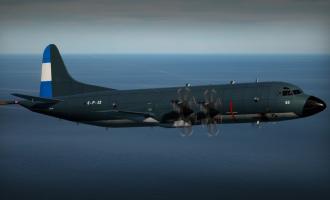On May 31, 16 Chinese aircraft allegedly intruded into Malaysia’s sovereignairspace. Royal Malaysian Air Force planes from Labuan Air Base were scrambled to intercept Chinese planes, which were detected within 60 nautical miles of Sarawak state, which share borders with Indonesia’s West Kalimantan. The location is inside Malaysia’s exclusive economic zone in the South China Sea (SCS).
Malaysian Air Force identified the Chinese aircraft as Ilyushin Il-76s and Xian Y-20s and they were flying in a tactical formation at up to 27,000 feet.. Malaysian Foreign Minister Hishammuddin Hussein condemned the incident as an “intrusion”.
"Malaysia's stand is clear - having friendly diplomatic relations with any countries does not mean that we will compromise on our national security," Hishammuddin said in a statement.
The Malaysian Foreign Ministry, which described the incident as a “serious threat to national sovereignty”, summoned Chinese Ambassador to Malaysia Ouyang Yujing to explain in detail about the incident.
However, China said that its planes had followed international law. A statement from the Chinese Embassy in Kuala Lumpur said that Chinese military aircraft enjoyed "the freedom of overflight in the relevant airspace".
"During this training, the Chinese military aircraft strictly abided by the relevant international law and did not enter the territorial airspace of any other country," an embassy spokesman told journalists.
"China and Malaysia are friendly neighbors, and China is willing to continue bilateral friendly consultations with Malaysia to jointly maintain regional peace and stability." Though in the beginning, China did not dispute the number of aircraft involved in the incident, last week a Chinese military source told the South China
Morning Post that China sent only two transport aircraft to the area. They were on a mission to deliver essential supplies to People’s Liberation Army soldiers stationed in the Chinese-held territory in the disputed SCS.
Intruding into other countries’ EEZs is not a new thing for China, which claims more than 90 percent of the SCS based on its controversial Nine-Dashed Line map. Vietnam, Malaysia, the Philippines and Brunei Darussalam claim certain parts of the SCS based on the legally accepted 1982 United Nations Convention on the Law of the Sea (UNCLOS). Like China, Taiwan also claims the SCS based on the same Nine-Dashed Line map but it is not as aggressive as China.
In March, more than 200 Chinese fishing boats with maritime militia were spotted in near Whitsun Reef, a shallow coral region about 175 nautical miles (324 kilometers) west of Bataraza town in the western Philippine province of Palawan. Manila had lodged two diplomatic protests with Beijing and increased maritime patrols near the Spratly islands and Scarborough Shoal. China also intruded into the EEZs of Vietnam, Malaysia and Indonesia, which do not have any claim in the SCS, in the past.
This time China’s language is different. Instead of talking about Nine-Dashed line and its historical rights, China talked about international law and legal overflight rights. It’s a good sign, says Bill Hayton from the London-based Chatam House. But he cautioned immediately. “[But] I fear that China only respects the right of freedom of navigation for itself and not for others,” he said. “I fear that it’s a way of China demonstrating that its military reach is getting longer and that will be perceived as more threatening by its neighbors,” Hayton told the South China Morning Post
recently.
China’s exercising its right to overflight in Malaysia is similar to the US freedom of navigation operations. Washington conducts regular maritime and air patrols in the SCS, a strategic waterway, as part of “freedom of navigation” operations, which it says are necessary to keep the waters open and challenge illegal claims, drawing frequent protests from Beijing. Now China apparently
using the same tactic as the US. Echoing a similar view with Hayton, another scholar told the same newspaper that Chinese action was not illegal.
“China wants to have it both ways: they scream when the Americans do this [freedom of navigation operations] to them, but then they go and do it to others. In the case of Malaysia, it is even worse, because the Chinese don’t even recognise Malaysia’s [exclusive economic zone] arguing that everything within the illegal nine-dash line is theirs,” Zachary Abuza, a professor at the National War College in Washington, said.
Unfortunately, neither ASEAN nor other SCS claimant states condemned Chinese actions in Malaysia and the Philippines. But the U.S., the strategic rival of China and the sole superpower, gave its tacit support to both Malaysia and the Philippines. It also gave support to Taiwan, which faces intimidation and military threat from China..
“We support our partners in the Royal Malaysian Air Force and encourage [China] to respect the sovereignty of all nations,” an officer from the Pacific Air
Forces public affairs department told This Week In Asia at the weekend.. The US Pacific Air Forces Commander Gen. Kenneth S. Wilsbach, on Friday, condemned Chinese military flights off Malaysia, the Philippines and Taiwan , describing them as “escalatory” and “destabilising”.
“We set ourselves up for miscalculations around the region when we have some of these activities when we’re getting into people’s airspace that we shouldn’t,”
said Wilsbach. Chinese intrusion into Malaysian airspace came just ahead of the Special ASEAN-China Foreign Ministers Meeting in the Chinese city of Chongqing, which began on Monday (June 7). The meeting was part of the celebrations to mark the 30 years of dialogue relations between ASEAN and China.
Surprisingly, Malaysian Foreign Minister Hishammuddin was not there at the Special ASEAN-China Foreign Ministers Meeting in Chongqing on Monday. It was not clear it was a form of protest against China or any other strong reason for not attending the important meeting. Malaysian Foreign Ministry said in a statement recently that Hishammuddin was in quarantine after exposing to a
COVID-19 patient. He cancelled his trips to Chongqing, Egypt, Kuwait and
Qatar. "Although the foreign minister has undergone two PCR tests which have been found negative, under guidelines prescribed by MOH (Ministry of Health), the foreign minister is required to undergo compulsory quarantine and self- isolation," the statement said.
Malaysia’s Deputy Foreign Minister Datuk Kamarudin Jaffar attended the meeting in Chongqing on Monday.
The recent tensions in the SCS and negotiations on the Code of Conduct in the SCS came for the discussion at the Chongqing meeting. Chinese Foreign Ministry said in a statement on Monday night that the dialogue platform showed that even though neighbors might sometimes have friction, they can “transform their contradictions into cooperation” for regional peace and stability. “We must jointly maintain stability in the South China Sea and avoid unilateral actions that may intensify conflicts,” the statement said, calling for a speedy completion of a Code of Conduct in the SCS. Coming back to Malaysia, which has very good economic relations with China,
has problems with Beijing for a long time.
Malaysia controls Luconia Shoals, off Sarawak, where hydrocarbon exploration is taking place. But these Luconia Shoals are claimed by both China and Taiwan based on the Nine-Dashed Line map. These shoals are located deep inside the Malaysia’s EEZ while they are more than 2,000 kilometers away from the Chinese shore. Chinese coastguard vessels frequently sail in the area to
intimidate Malaysia and spy on latter’s energy exploration activities. In June 2015, a Chinese Coast Guard vessel entered Luconia Shoal and Malaysia strongly protested against Beijing’s unfriendly act. Around 100 Chinese fishing boats were spotted at Luconia Shoals in March 2016. On March 31, 2016, Malaysia summoned Chinese Ambassador to protest the presence of
Chinese fishing boats in its EEZ. Chinese fishing vessels intruded into Indonesia’s EEZ in 2016 and 2020. The same thing was repeated in EEZs of the Philippines and Vietnam from time and again.
Assertive China has been violating international maritime laws by encroaching into other countries territories and EEZs in the SCS. It built illegally artificial islands through reclamation in the SCS and turned some of them into military installations. In 2016, Permanent Court of Arbitration ruled that China couldnot claim any territory beyond its territorial waters and EEZ based on the Nine-
Dashed Line map.
ASEAN member states must unite to seek a viable and legally binding Code ofConduct in the SCS and a rules-based regional architecture. For this, Indonesia, the de facto leader of ASEAN, Vietnam, the Philippines, Malaysia and Brunei, the current chair of ASEAN, must take lead in this effort.

Κόσμος
Ενημερώθηκε στις:
Aggressive China intrudes into Malaysian airspace

Ακολουθήστε το Πενταπόσταγμα στο Google news













